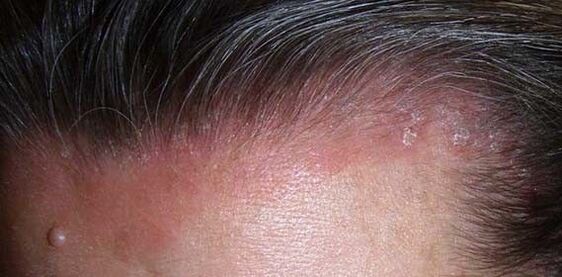
The first manifestations of psoriasis usually appear on the head and then spread throughout the body. Head psoriasis occurs with itching and a risk of bacterial complications. If you suspect the psoriatic nature of the rash, you should consult a doctor immediately - the disease responds well to treatment from the start. This article contains all the information about the symptoms of this disease and all known treatments.
Causes of scalp psoriasis
This is a chronic non-infectious dermatological process that develops in individuals with a genetic predisposition. The cause of scalp psoriasis and the mechanisms by which it develops are not fully understood. But it has been established that the process develops in the context of metabolic and immune diseases. The body loses control over the division of skin epithelial cells: they start dividing faster. Equally quickly, signs of keratinization appear, in the form of peeling. At the same time, inflammatory processes develop in the skin.
Main causes of scalp psoriasisis a genetic predisposition. Scientists are trying to identify the genes that cause the disease to be passed on from generation to generation. Separate altered regions associated with different genes have been identified in patients and their close relatives.
But people with a genetic predisposition don't necessarily get sick. Equally important are external and internal triggers. Scalp psoriasis begins in genetically predisposed individuals due to exposure to:
- Mechanical irritation of the skin (with a stiff-toothed brush; damage to small wounds and scabs of seborrhea, etc. );
- cold exposure;
- Transfer of infectious diseases; usually after streptococcal impetigo - purulent rash mainly on the facial skin; develops in children and becomes the driving force for the development of autoimmune processes;
- chronic stress and high load;
- frequent smoking and drinking;
- Eating disorders - irregular nutrient-dense dry foods, excessive consumption of high-calorie foods and spicy spices;
- Suffering from hormonal disorders that affect the state of the sebaceous glands in the skin - obesity, sex hormone imbalance, diabetes, thyroid disease, pituitary gland, hypothalamus;
- In liver and kidney disease where the function of these organs is impaired; toxins are neutralized in the liver and excreted through the kidneys; poisoning can be the starting point for disease development.
The interaction of an organism with its environment is disrupted under the influence of one or more factors. The metabolism of proteins, fats and carbohydrates is disturbed, resulting in accelerated metabolic processes of the skin and its peeling.
Any localized psoriasis can spread throughout the body, so don't delay treatment.
Changes in the immune system manifest as an increased sensitivity of the skin to any external influence (other than brushing or frequent hair coloring). In response to this effect, their own cells produce antibodies that trigger an autoimmune inflammatory process. Why the inflammation starts is not fully understood. This is one of the medical priorities in the direction of treating psoriasis.
Symptoms of Scalp Psoriasis
Psoriasis of the head manifests itself in the form of characteristic symptoms. The disease can begin acutely with multiple rashes (the commonly known form of psoriasis) or gradually develop itching and flaking of the skin before the characteristic rash (the seborrheic form).
The more frequent attacks are gradual, in the form of dandruff and flaking. In the early stages, these are small areas of the occipital region. The peeling spreads to a larger area and it starts to itch. Constantly scratching the skin can cause the skin to become thicker and chafed. What does scalp psoriasis look like? The first symptoms of psoriasis on the head in the photo are this:
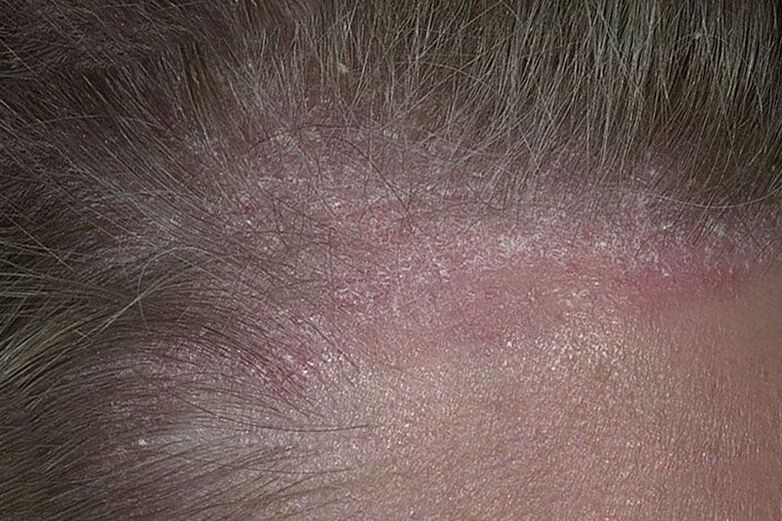
In areas of scratches and abrasions, redness first appears, followed by small inflammatory nodules and papules, surrounded by a bright edge that rises from the surface of the skin. Along with intense itching, the rashes enlarge and merge with each other. The rash is characterized by:
- White "shavings" that cover the papules; when scratched, it resembles stearin spots; in the seborrheic form, the scales are yellowish and the stearate spots are less noticeable;
- If you scrape off all the "shards", a smooth translucent surface opens;
- Further scratching will cause blood droplets to appear on the surface - "blood dew".
In the photo, the three signs look like this:
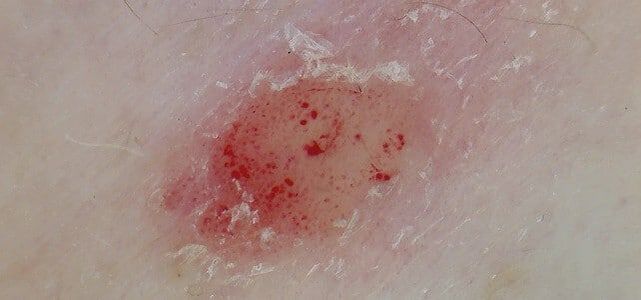
These three characteristic manifestations distinguish scalp psoriasis from seborrheic dermatitis and are easily confused. In the future, the papules coalesce and form psoriatic plaques, which have different configurations and sometimes spread across the entire head surface.
The course of scalp psoriasis can be mild, with a single rash in the initial stages. These rashes then go through all three stages of development. In severe forms, the rash occupies the entire vital area and spreads to the face and neck in the form of a crown - an inflammatory border covered with silvery scales. Hair roots are not affected, but bacterial, fungal, or mixed infections often join the psoriasis process, which can lead to complications that are less easily cured. Here's what the crown looks like:
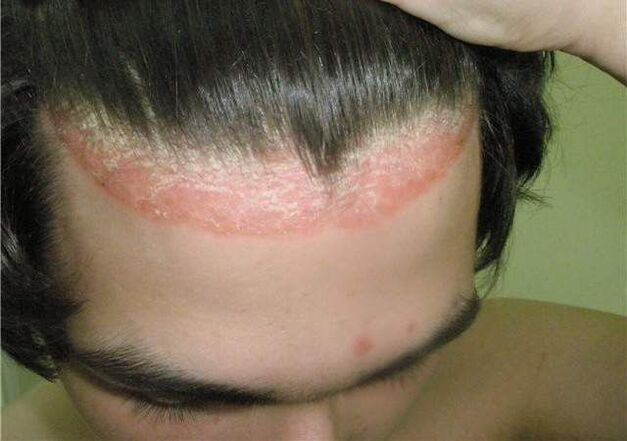
Stages of scalp psoriasis
The disease persists for a long time, and exacerbations are replaced by remissions. The frequency of exacerbations and the severity of symptoms depend on the presence of predisposing factors.
Progressive stage
The rash and inflammation spread, accompanied by intense itching. In the initial stage, there are symptoms of Koebner - a psoriatic rash on the scratches and abrasions.
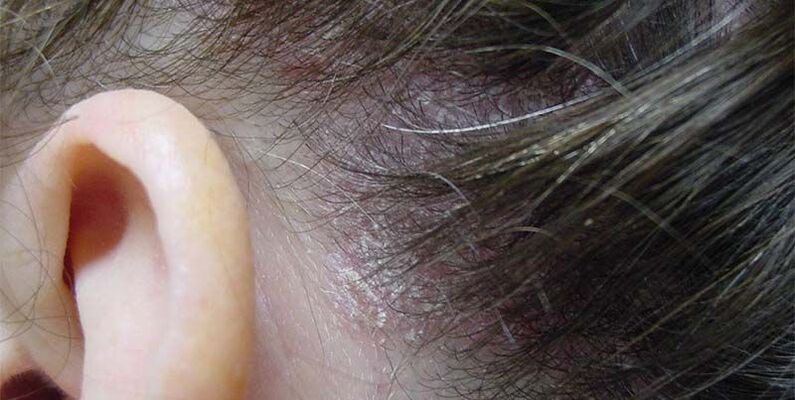
stationary
The process is in the same state, no spreading, but no fading either.
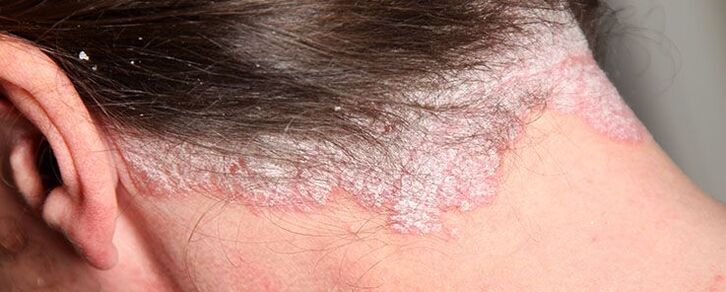
regressive
The process gradually subsides, the pruritus disappears, the rash becomes white, the inflammatory infiltration decreases, and spots gradually appear; the color of the rash begins to pale in the center, forming a ring pattern with brighter edges. Sometimes they start to pale from the periphery toward the center, and then appear as a whitish ring (the symptom of psoriasis of the head is Voronov's pseudo-atrophy). The healing phase can take quite a while, and gradually only white, depigmented spots remain on the skin.
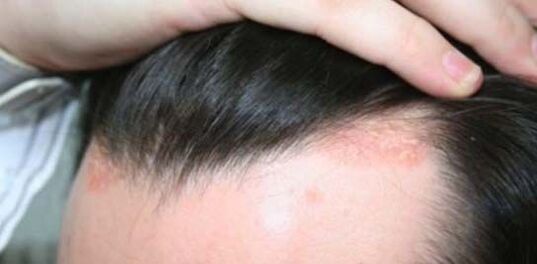
Treatment of scalp psoriasis
Scalp psoriasis requires systemic treatment under the supervision of a doctor. What is decisive is a mobile lifestyle, quitting smoking and drinking, and dieting. It is necessary to treat the disease in a complex way, applying techniques that take into account the physical characteristics of the patient. Sophisticated treatments can include modern European methods, drug treatments, and Eastern methods proven over the centuries. This treatment can significantly improve the patient's condition immediately and achieve stable remission within a few weeks.
PRP - Therapy - This method is based on the ability of platelets (red platelets) to secrete growth factors that stimulate the ability of cells to regenerate. By centrifugation, the patient's blood is enriched with platelets and then injected into the scalp point by point. This technique can significantly accelerate the onset of remission and prevent the development of relapses.
Autohemotherapy - Treatment by intramuscular injection of a small amount of blood drawn from a patient's vein. This has a general stimulating effect and restores the epithelial cells of the head. After treatment, stable remissions were observed.
Reflexology is the effect of various ways on specific parts of the body, reflexively associated with organs and tissues. One of the oldest and most effective traditional healing methods. The acupuncture points can be impacted by acupuncture (acupuncture), cautery, massage, etc. Treating scalp psoriasis with these methods has been practiced in Eastern medicine for thousands of years. Treatment is performed by a reflexologist.
Vacuum therapy - the effect of thin air on biologically active points - is one of the methods of reflexology. Can be done using cans or special equipment. Facilitates rapid recovery from altered tissues. The affected area is significantly reduced due to the use of vacuum therapy.
Phytotherapy - Dermatologists use medicinal plants extensively in their practice, including infusions, decoctions, and ready-made medicinal forms. When used correctly as part of a complex treatment, they are very effective in both the initial stage and the long-term form of the disease. If you add phytotherapy, the effectiveness of other treatments increases and the risk of adverse drug effects decreases.
Treatment of scalp psoriasis in clinic
In specialized clinics, the disease is treated by trained and clinically experienced dermatologists who use all currently known methods to treat the disease. In their work, they combine new Western medical methods with traditional Eastern methods that have been successfully used by ancient Chinese and Tibetan physicians for thousands of years.
To avoid recurrence, the cause must be eliminated
Specialty clinics use a variety of approaches, taking an individual approach to each patient. The combination of several complexes of traditional methods with drug therapy can make the patient permanently free from scalp skin problems.
Not only patients who regularly receive supportive care, but also colleagues from other clinics in Moscow have noted the effectiveness of clinic treatments in their reviews and comments.
Prevent scalp psoriasis
Prevention of psoriasis of the head is especially necessary for people with a genetic predisposition to the disease in a relative. It includes removing the effects of:
- any prolonged contact with the skin;
- Malnutrition and a sedentary lifestyle;
- prolonged stress and heavy loads;
- smoking and drinking;
- hormonal disorders - if such a disorder is suspected, you should contact an endocrinologist immediately;
- Poisoning - prompt treatment of all chronic diseases that lead to impaired metabolism and immunity.
A dermatologist will tell you how to cure psoriasis on the scalp after the examination. Therefore, you should not delay on the advice of experts, as the initial stages of the disease are easier to treat. Can we cure this process? There is absolutely no chance of a cure for the disease, but if a person is treated regularly, there is a good chance of getting rid of long-term relapses.
Tinea capitis diet?
There is no special diet, but scalp psoriasis treatment consists of 4 proper meals a day that contain all the components of the diet that the body needs. Foods that irritate the skin should not be on the table:
- spicy, salty, sour;
- Fruits rich in essential oils (fresh garlic and onions, radishes);
- Fried, smoked, canned food;
- Caffeinated beverages - strong tea, coffee, Coca-Cola, etc. ;
- Alcoholic beverages - they contribute to the development of disease recurrence.
Meat consumption has been established to exacerbate the disease, so foods such as complex carbohydrates, lean meats, cottage cheese, and yogurt should be included in the diet.
Medications for scalp psoriasis?
Drugs are selected based on the patient's condition and the presence of certain disease symptoms. In the initial stages of scalp psoriasis, the following topical preparations are used:
- When wet, solutions and creams are prescribed to eliminate these symptoms and prevent bacterial and fungal infections;
- If the skin is dry, treat with ointment; salicylic acid ointment - has a softening effect; ointments with tar have the same effect; zinc-containing ointments and analogues of vitamin D3 + glucocorticoid betamethasone help a lot - itHelps to quickly eliminate the symptoms of psoriasis;
- Ointments and creams containing corticosteroids are used to treat psoriasis, which is common on the scalp;
- Shampoos are widely used; so, tar shampoos relieve inflammation and soften scabs; zinc shampoos have antiseptic and softening properties and relieve inflammation; shampoos have been used for a long time.
Folk remedies for scalp psoriasis?
Is it possible to treat scalp psoriasis with folk remedies? Most specialists use folk remedies to treat the disease symptomatically (elimination of certain symptoms). But you need to be clear:
- It is necessary to treat the disease with folk remedies on the advice of a dermatologist;
- It is impossible to cure the disease with folk remedies alone; dermatologists prescribe complex treatments combined with traditional medicine.























